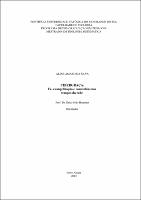| Compartilhe o registro |


|
Use este identificador para citar ou linkar para este item:
https://tede2.pucrs.br/tede2/handle/tede/5993Registro completo de metadados
| Campo DC | Valor | Idioma |
|---|---|---|
| dc.creator | Silva , Aline Amaro da | - |
| dc.creator.Lattes | http://buscatextual.cnpq.br/buscatextual/visualizacv.do?id=K4685369Z5 | por |
| dc.contributor.advisor1 | Hammes , Érico João | - |
| dc.date.accessioned | 2015-05-13T11:31:41Z | - |
| dc.date.issued | 2015-03-11 | - |
| dc.identifier.uri | http://tede2.pucrs.br/tede2/handle/tede/5993 | - |
| dc.description.resumo | A presente dissertação examina os efeitos da invenção da internet na teologia e sociedade, definindo o que é ciberteologia a fim de descobrir qual sua contribuição para melhor compreender e inter-relacionar a cultura, a fé e o ser humano contemporâneo. Delimita-se o tema em cibergraça, entendida como a comunhão entre as pessoas nos tempos da rede. Primeiro, apreende-se o ciberespaço como um lugar profundamente antropológico onde se pode refletir teologicamente. O estudo também busca verificar como a rede afeta ou potencializa a relação de comunhão entre as pessoas, em especial com a juventude, público predominante no ciberespaço. Além disso, analisa o valor eclesiológico da internet na missão de evangelizar todos os povos, construindo a relação entre evangelização e comunhão na era digital. O trabalho utiliza basicamente os métodos de pesquisa exploratória, bibliográfica e documental. A dissertação se fundamenta principalmente nas obras e artigos de Antonio Spadaro, autor do livro e do campo teológico “Ciberteologia”, pano de fundo deste estudo. Para fundamentar a análise sociológica e cibercultural do primeiro capítulo, faz-se uso de autores como Manuel Castells, Pierre Lévy e André Lemos. Na teologia trinitária destaca-se a contribuição de Gisbert Greshake e John Zizioulas. Também o trabalho se inspira no pensamento científico-teológico de Teilhard de Chardin seja diretamente ou indiretamente através de autores como Jennifer Cobb, com sua obra “Cybergrace”. | por |
| dc.description.abstract | This dissertation examines the effects of the invention of the internet in theology and society, defining what is cybertheology to find out what their contribution to better understand and interrelate culture, faith and the contemporary human being. Wraps up the theme in cybergrace, understood as the communion of persons in the network times. First, seize up cyberspace as a profoundly anthropological place where you can reflect theologically. The study also aims to verify how the network affects or enhances the relationship of communion between people, especially youth, predominant public in cyberspace. Furthermore, it analyzes the ecclesiological value of the internet in the mission of evangelizing all people, building the relationship between evangelization and communion in the digital age. The work uses basically the methods of exploratory, bibliographical and documental research. The dissertation is based mainly in books and articles by Antonio Spadaro, author of the book and the theological field "Cybertheology" background of this study. In support of sociological and cybercultural analysis of the first chapter, makes use of authors such as Manuel Castells, Pierre Lévy and André Lemos. In Trinitarian theology highlights the contribution of Gisbert Greshake and John Zizioulas. Also the work is inspired by scientific and theological thought of Teilhard de Chardin either directly or indirectly through authors such as Jennifer Cobb, with her work "Cybergrace". | eng |
| dc.description.provenance | Submitted by Setor de Tratamento da Informação - BC/PUCRS ([email protected]) on 2015-05-13T11:31:41Z No. of bitstreams: 1 468444 - Texto Completo.pdf: 1261772 bytes, checksum: 30521ed51d8060a444504d25ff2b7519 (MD5) | eng |
| dc.description.provenance | Made available in DSpace on 2015-05-13T11:31:41Z (GMT). No. of bitstreams: 1 468444 - Texto Completo.pdf: 1261772 bytes, checksum: 30521ed51d8060a444504d25ff2b7519 (MD5) Previous issue date: 2015-03-11 | eng |
| dc.description.sponsorship | Coordenação de Aperfeiçoamento de Pessoal de Nível Superior - CAPES | por |
| dc.format | application/pdf | * |
| dc.thumbnail.url | http://tede2.pucrs.br:80/tede2/retrieve/162713/468444%20-%20Texto%20Completo.pdf.jpg | * |
| dc.language | por | por |
| dc.publisher | Pontifícia Universidade Católica do Rio Grande do Sul | por |
| dc.publisher.department | Faculdade de Teologia | por |
| dc.publisher.country | Brasil | por |
| dc.publisher.initials | PUCRS | por |
| dc.publisher.program | Programa de Pós-Graduação em Teologia | por |
| dc.rights | Acesso Aberto | por |
| dc.subject | RELIGIÃO | por |
| dc.subject | CIBERESPAÇO - ASPECTOS RELIGIOSOS | por |
| dc.subject | CRISTIANISMO E CULTURA | por |
| dc.subject | INTERNET - ASPECTOS RELIGIOSOS | por |
| dc.subject | EVANGELIZAÇÃO | por |
| dc.subject | COMUNHÃO | por |
| dc.subject.cnpq | CIENCIAS HUMANAS::TEOLOGIA | por |
| dc.title | Cibergraça : fé, evangelização e comunhão nos tempos da rede | por |
| dc.type | Dissertação | por |
| Aparece nas coleções: | Programa de Pós-Graduação em Teologia | |
Arquivos associados a este item:
| Arquivo | Descrição | Tamanho | Formato | |
|---|---|---|---|---|
| 468444 - Texto Completo.pdf | Texto Completo | 1,23 MB | Adobe PDF |  Baixar/Abrir Pré-Visualizar |
Os itens no repositório estão protegidos por copyright, com todos os direitos reservados, salvo quando é indicado o contrário.




